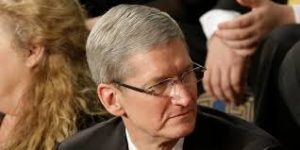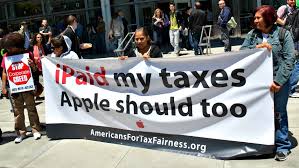 A bit more than two years ago, I wrote a post about Anglo American’s giant Minas Rio Iron Ore mine in Brazil and how the company had worked hard to connect with the people who live near the mine and along the 529 Km pipeline to the port from which they ship the ore to Asian markets. The case of Apple’s apparent tax avoidance and the € 13 Billion ($ 14.6 Billion) fine leveled against it by the European Union seems to be just the start of what could be a sea change in the tax liability of high tech companies. My guess is that all of Apple’s operations and that of other tech firms are perfectly legal and come under the idea of tax avoidance rather than tax evasion, which is a crime.
A bit more than two years ago, I wrote a post about Anglo American’s giant Minas Rio Iron Ore mine in Brazil and how the company had worked hard to connect with the people who live near the mine and along the 529 Km pipeline to the port from which they ship the ore to Asian markets. The case of Apple’s apparent tax avoidance and the € 13 Billion ($ 14.6 Billion) fine leveled against it by the European Union seems to be just the start of what could be a sea change in the tax liability of high tech companies. My guess is that all of Apple’s operations and that of other tech firms are perfectly legal and come under the idea of tax avoidance rather than tax evasion, which is a crime.
The issue, as well described by an article in Fortune, is that it appears that under Tim Cook, Apple has gone out of its way to avoid paying taxes in the U.S. and in fact anywhere else. The broader issue is that the current tax code was not written for firms which develop ideas in California, produce machines in China, and sell them all over the world through a variety of on and off line retail channels. It is even less equipped to deal with firms which do not actually sell any machines at all but supply services in the cloud.
What makes things even more complex is that it also appears that much of Apples’ famed 216 Billion in cash is actually held in bank accounts outside of the U.S. and thus is not subject to U.S. taxes. According to an article in marketwatch, Apple will not bring this money back to the U.S. in order to avoid those taxes.
 The problem, as I see it has little to do with tax law and everything to do with public opinion and is thus linked to the issue of firms doing the right thing in terms of environmental performance. It takes years for a company to establish its reputation with civil society and be perceived as a force of good. As discussed at length last year in the case of the Volkswagen scandal, it only takes a few moments to lose much of that reputation and Apple is at the risk of doing just that with a segment of the population.
The problem, as I see it has little to do with tax law and everything to do with public opinion and is thus linked to the issue of firms doing the right thing in terms of environmental performance. It takes years for a company to establish its reputation with civil society and be perceived as a force of good. As discussed at length last year in the case of the Volkswagen scandal, it only takes a few moments to lose much of that reputation and Apple is at the risk of doing just that with a segment of the population.
Last year I gave Mathias Muller, the Volkswagen CEO unsolicited advice as to what to do about the emissions scandal which he did not take at least up until now. My suggestion was to give every VW owner a cash award for the loss of residual value, pay for the fix, and give them a new nameplate for the back of the car so that they could show their friends and neighbors that they were no longer polluting.
My advice to Tim Cook is to re-calculate Apple’s tax liabilities in the U.S., the U.K. and other key markets as if it had no work arounds, dummy corporations or slick lawyers. How much would the total theoretical tax bill be for the last five years, for example. Lets say, for the sake of argument it was on the order of $ 50 billion. The world’s governments could do an awful lot of good with that money and if Apple were to donate it all to the international climate fund called for in Paris last year, they would win universal praise and be doing the right thing. Going forward, why not just pay their taxes like the rest of us do


Great article. Yes I totally agree on the fact that great leaders are in short supply….unfortunately